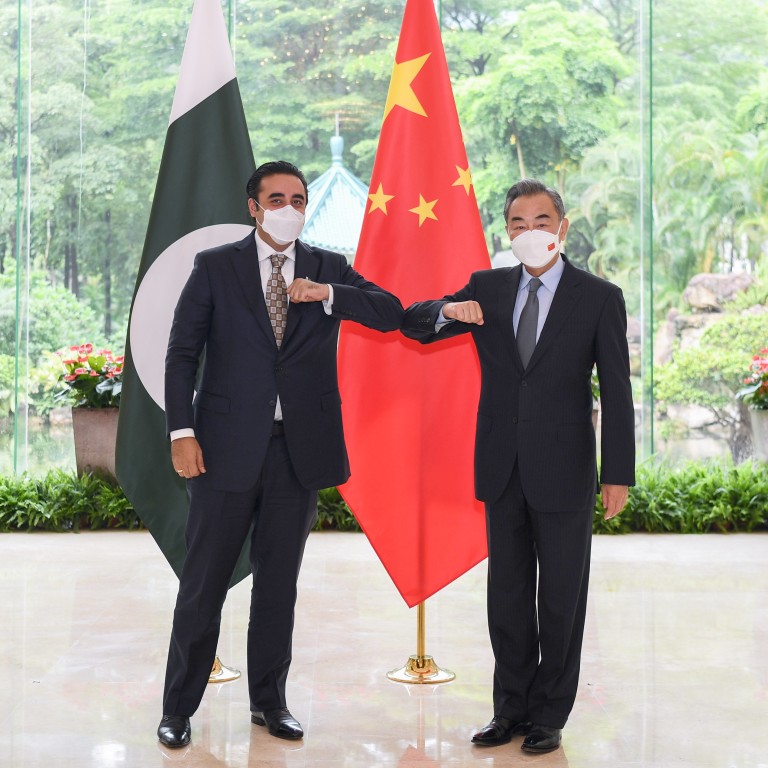
China says Washington’s ‘divisive’ Indo-Pacific strategy doomed to fail
- Chinese Foreign Minister Wang Yi accuses US of forcing countries in the region to take sides by disrupting supply chains
- Wang’s comments come just as President Joe Biden prepares to launch regional economic framework with Quad partners
Beijing has rejected Washington’s Indo-Pacific initiatives as tools to contain China that are “doomed to fail”, as US President Joe Biden prepares to unveil the latest US strategy to step up regional engagement.
Chinese Foreign Minister Wang Yi’s withering assessment that the United States is creating division in the region came one day ahead of Biden’s launch of a raft of Indo-Pacific economic initiatives in Tokyo.
The Biden administration’s framing of IPEF as a tool to counter China’s regional clout is likely to find a sympathetic audience among members of the US Congress, where competition with Beijing remains a bipartisan area of concern.
In talks with Pakistan’s new foreign minister, Bilawal Bhutto Zardari, in Guangzhou on Sunday, Wang questioned if the IPEF was forcing countries to take sides between Washington and Beijing, by disrupting supply chains.
“Is the US trying to accelerate the recovery of the world economy, or is it creating economic decoupling, technological blockade, industrial chain disruption, and aggravating the supply chain crisis?” Wang said.
“A few years ago, the US launched the trade war with China, which brought serious consequences to the world and to the US. The lessons are profound. The US should know its mistakes and correct them, rather than repeating mistakes.”
Wang said it would be wrong for the US to use the initiatives as a political tool to exclude others.
“Is the United States using economic means to coerce regional countries to choose sides between China and the United States?” he said, according to a statement from the Chinese foreign ministry.
Biden began his first trip to Asia as US president in South Korea on Friday, meeting newly elected leader Yoon Suk-yeol before heading to Tokyo.
On Monday, Biden called on Emperor Naruhito before joining Japanese Prime Minister Fumio Kishida for discussions that were expected to include Japan’s plans to expand its military capability and reach in response to China’s growing might.
At the start of his meeting with Kishida, Biden said the new Indo-Pacific economic framework was intended as a pushback against an assertive China that would bring concrete benefits for the region.
He also said the US was fully committed to the defence of Japan, its long-time ally, and expressed appreciation for Tokyo standing up for democratic values in its response to Russia’s invasion of Ukraine.
Kishida welcomed Biden’s visit as a demonstration of US commitment to the region, adding that the two allies needed to lead the world in ensuring a rules-based free and open Indo-Pacific.
A Quad summit with the leaders of Japan, Australia and India will take place on Tuesday.
Biden’s trip coincides with escalating rivalry and tensions between China and the US – with Beijing warning against attempts by Washington to boosts its alliances in the region.
What is the Quad, and how will it impact US-China relations under Biden?
“The ‘Indo-Pacific strategy’ is concocted by the United States under the banner of ‘freedom and openness’, but it is indeed keen to form cliques to create ‘small circles’ with the aim of changing China’s surrounding environment in an attempt to contain China, using Asia-Pacific countries as ‘pawns’ for US hegemony,” Wang said in his meeting with Zardari.
“Facts will prove that the so-called Indo-Pacific strategy is essentially a strategy for creating divisions, inciting confrontation, and for destroying peace. No matter how it is packaged, it will ultimately be a failure.”
Wang said China had become the largest trading partner for most countries in the region. “Trying to use a framework to isolate China will ultimately isolate themselves.”
Additional reporting by Kyodo, Bloomberg and Reuters

